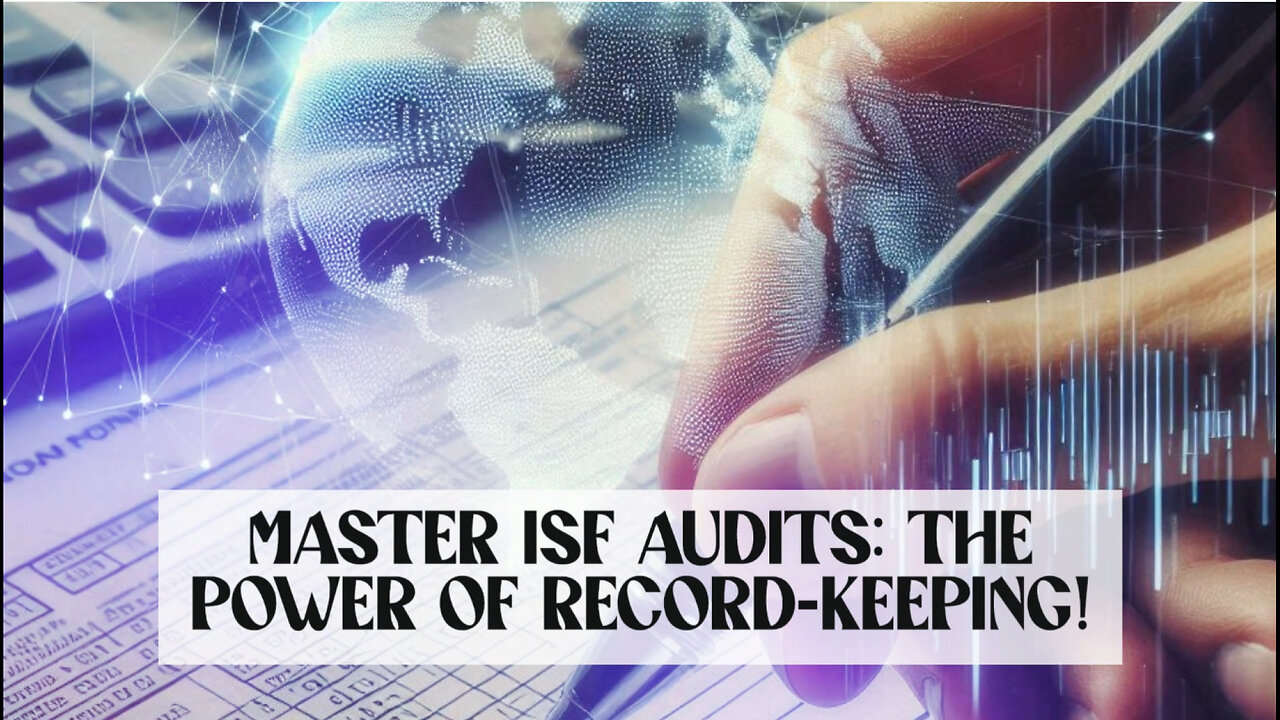Premium Only Content

Mastering Proper Record-Keeping: Essential Tips for ISF Filing Audits
ISF Solution | (832-904-9333)
[email protected] | www.isfsolution.com
Importer Security Filing (ISF) audits are increasing in frequency as customs authorities seek to enforce compliance with ISF requirements. These requirements involve providing specific information about each container shipment 24 hours before it is loaded onto a vessel bound for the United States. Failing to comply can result in penalties and delays. Proper record-keeping is crucial during ISF filing audits, as it ensures the accuracy and consistency of the information provided in the ISF. Importers must maintain records such as commercial invoices, bills of lading, packing lists, and other relevant documents to validate the information entered in their ISF filings. These records also help importers comply with CBP's record-keeping requirements. Importers should have supporting documents readily available during an ISF filing audit to demonstrate compliance. Adequate record-keeping can also help importers in the event of disputes or claims related to the shipment, enabling them to provide evidence of the goods' contents, value, and condition. To maintain proper record-keeping practices, importers should establish a dedicated system for organizing and storing documents, ensure consistency in data entry, conduct regular record audits, and train staff on the importance of compliance. By following these practices, importers can ensure compliance with ISF requirements and protect their interests in international trade.
#usimportbond #isfcustomsbroker #uscustomsclearing #isfentry
Video Disclaimer Here: For educational purposes - No affiliation with US government sectors.
00:27 - ISF Audits are crucial in global trade, ensuring importers comply with ISF requirements to avoid penalties and delays.
00:55 - Proper record-keeping is essential for ISF filing audits, including accurate and complete documentation like commercial invoices and bills of lading.
01:19 - Maintaining thorough records helps importers validate ISF information, comply with CBP requirements, and provide evidence during audits or disputes.
02:26 - Tips for effective record-keeping include creating a dedicated system, ensuring data consistency, conducting regular audits, and educating staff on the importance of compliance.
-
 LIVE
LIVE
Joe Donuts Live
4 hours agoA New Journey Into Alan Wake’s Dark and Twisted World
358 watching -

Boxin
3 hours agoStarting Tomb Raider 2 remastered!
4.4K -
 10:47
10:47
stateofdaniel
1 day agoHouse Dem Claims ICE Pepper Sprayed Her in the Face, BUT the Video Tells a Different Story
10.5K35 -
 DVR
DVR
Pickleball Now
3 hours agoLive: IPBL 2025 Day 7 | Electric All-Star Battle & Epic Hyderabad Royals vs Mumbai Smashers Final!
11.2K1 -
 9:29
9:29
Sideserf Cake Studio
21 hours ago $5.71 earnedHyperrealistic CAKE of a Nostalgic Christmas Decoration!
61.2K9 -
 41:54
41:54
American Thought Leaders
17 hours agoHere’s the Real Problem for America’s Middle Class | Robert Kiyosaki
22.8K9 -
 27:56
27:56
Degenerate Plays
1 day ago $3.79 earnedDiagnosed From My Sonic The Hedgehog Fixation? - Batman: Arkham Asylum : Part 17
18.3K -
 1:31
1:31
Damon Imani
3 days agoWhoopi TRASHED Kash Patel’s FBI and Got Calmly DESTROYED by Damon!
33.9K18 -
 2:06
2:06
Memology 101
12 hours ago $2.33 earnedWON'T SOMEBODY PLEASE THINK OF THE POOR NARCOTERRORINOS?!
22K22 -
 18:43
18:43
Nikko Ortiz
1 day agoWorst Karen Internet Clips...
147K19